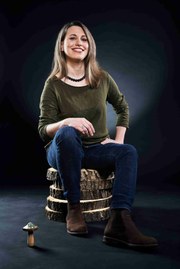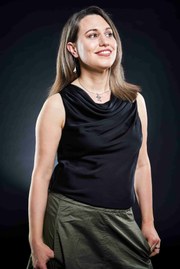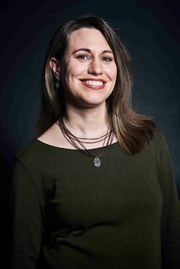Women shaping knowledge - a campaign of the University of Freiburg
Of women in research and stay-at-home dads
https://uni-freiburg.de/fsw/kathrin-blumenstein-en/
 |
“It’s not just about having completed your research work at the end, but about approaching the subject area with joy and passion.” And that’s what Kathrin Blumenstein does; when she talks about her work – or rather her passion – her friendly brown eyes light up with enthusiasm. And her fascination is infectious: I am spellbound as I immerse myself with her in a world of trees, fungi and microorganisms. Blumenstein is a junior professor of tree pathology – the only one in Germany. Only here in Freiburg is there such a professorship. Together with her team, she researches tree diseases caused by microorganisms, especially by fungal pathogens, at the Institute of Forest Sciences in the Faculty of Environment and Natural Resources. In her tidy office, a tree slice serves as a meeting table – judging by the growth rings, the tree must have been well over a hundred years old. Here, Blumenstein explains how fungal organisms grow in trees and interact with each other: They can either have a positive effect on their hosts and strengthen their vitality, or infect a tree as pathogens. Climate change, droughts, floodings and poor soil conditions benefit pathogenic fungi. “It’s like us humans – anything that stresses the tree weakens its immune system.” The pathology of trees investigates how pathogens work and how they spread in order to understand how the resilience, the defense mechanisms of trees, could be strengthened in the future. “You can’t cure a sick tree,” says Blumenstein. That is why it is important to develop preventative measures and put them into practice. |
 |
The young professor doesn’t work forty hours a week – but rather sixty: “You don’t just invest a lot of time in a job like this, but also a lot of personal motivation and emotion. It’s not just a job, my work is always present.” Where does she get her energy, motivation and strength from? “What fascinated me right from the start was the sense of purpose – through my research, I can make a concrete contribution to the health of forests.” So much for the technical level. But is that enough to dedicate yourself to your work around the clock with such passion? “I love the fact that every day is completely different from the last.” Kathrin Blumenstein likes the complexity of her tasks and enjoys facing challenges. Above all, however, she appreciates the creative freedom that her position brings. In the winter semester 2023/24, a new profile line for the Forest Science Master’s program will start, which she designed together with her colleagues: Forest Ecology Research. Together, they created a program they would have liked to see as students. “This profession gives you positive feedback in so many different ways: you publish a specialist article, are invited to give a lecture or sit in front of beaming faces in a lecture hall. It’s all so motivating that it makes me want to do my job every day.” On top of that, she also won the German Forest Science Award this year. “Of course, that was also super motivating!” she enthuses. But Kathrin Blumenstein is not only a professor, she is also a mother of three children and a wife. How does she juggle it all, career and family? “I never intended to do a doctorate. The way I perceived female doctoral students at German universities was not an attractive path for me,” she says thoughtfully. But when she went to Sweden for an internship at a forestry research institute before the end of her studies, she saw how much joy the doctoral students and postdocs were having in their work. They were even having a private life and families. “There were pregnant doctoral students – I thought that was wonderful!” she beams. In Sweden, Blumenstein saw that you don’t have to choose between career and family, between research and children. She found it inspiring how flexibly the working day could be organized, how men go home at three o’clock in the afternoon to pick up the children from kindergarten, how they take paternity leave as a matter of course. |
 |
Back in Germany – Blumenstein completed her doctorate in Sweden – she is a living example of this flexible family model: “My husband and I decided right from the start that if we had children, they would be our children. That care work is a shared responsibility and not just in the hands of the woman.” Her husband is currently looking after the children as a stay-at-home dad. Her environment has responded positively to this decision. “I was expecting some criticism, but I’ve only received support,” emphasizes Blumenstein. She is pleased to now know several colleagues who live a similar family model. At the same time, she knows that this is not the right path for everyone: “There are so many different life and family models. And all of them are good, as long as everyone has a choice.” Kathrin Blumenstein herself has not experienced any gender-specific discrimination in her career. Nevertheless, equality between men and women has not yet been achieved. What would she like to see in the future? “I think it’s important that there are role models that show that anything we want is possible. And by that I don’t just mean us women, but us as the future generation.” In order to successfully move towards a future with equal rights, it is not just women who need to stand up for this, but all genders. “Because ultimately, we all benefit from more diversity in our working and private lives.”
All photos by Gabor Richter |

